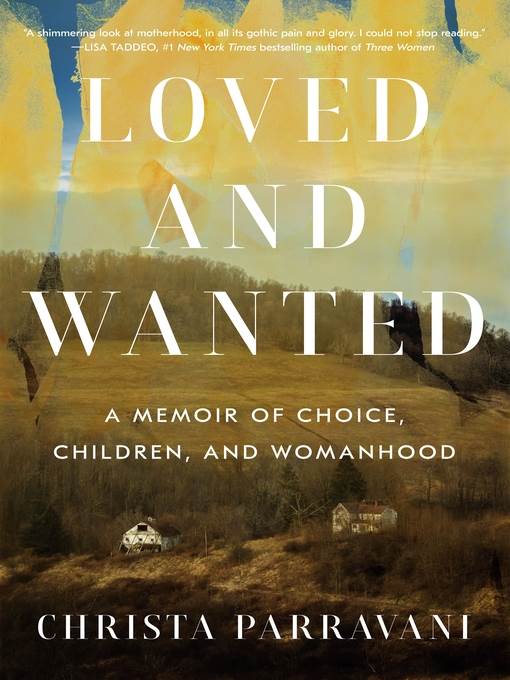
Loved and Wanted
A Memoir of Choice, Children, and Womanhood
فرمت کتاب
ebook
تاریخ انتشار
2020
نویسنده
Christa Parravaniناشر
Henry Holt and Co.شابک
9781250756855
کتاب های مرتبط
- اطلاعات
- نقد و بررسی
- دیدگاه کاربران
نقد و بررسی

June 15, 2020
Parravani (Her) exposes motherhood’s serrated edges in this searing exploration of love, autonomy, and abortion. Forty-year-old Parravani was deeply in debt and unexpectedly pregnant with her third child in 2017, and her tenure-track position at a West Virginia college provided the family’s only stable income, but still fell short of covering the bills. Certain this pregnancy spelled the end of her career, Parravani wanted an abortion, to which her husband responded, “It’s your body.” But one local gynecologist refused her request, and another would only prescribe her RU 486 if she promised not to tell anyone else at the practice. “Reduced to a vessel, I was rage-filled,” she writes. Options elsewhere were too far away and expensive to be practical. “Every path seemed strung with a trip wire.” Throughout, Parravani elucidates the nation’s patchwork of abortion laws and data about women who seek to end their pregnancies, finding that states that restrict reproductive freedoms also have the poorest health outcomes for infants and children. From the point at which Parravani decides to carry her son to term, the book turns to building a devastating indictment of how environmental contamination and inadequate healthcare harmed the two of her children born in West Virginia. This is a powerful account of what many women face in the U.S. today.

October 1, 2020
Parravani (Her: A Memoir) begins her luminous, complex story with a memory--one that is visceral, yet metaphoric and sets the tone for this work, which proves a welcome addition to women's narratives with its willingness to address poverty, sexuality, spirituality, and the difficult choices women are forced to make when navigating oppressive systems. Parravani then moves from the childhood memory to the central narrative: an unplanned pregnancy at age 40 that she wanted to terminate but was unable to because of the ways in which health care and medical regulations in her home state deterred her until she ended up too far along into her pregnancy for an abortion to be an option. She eloquently tells of her marriage and raising two children on set incomes, along with the fears and worries of providing for an additional child. VERDICT In a time when the wars waged on women's sexual bodies are happening in multiple, intersecting ways, especially through individual organizations and agencies' attempts to stop women from asking for or receiving what they are legally allowed to request, Parravani's story is cautionary and a call to action; as personal as it is political.--Emily Bowles, Lawrence Univ., WI
Copyright 2020 Library Journal, LLC Used with permission.

October 1, 2020
In Her (2013), Parravani told her identical twin's tragic story. Here she examines marriage, parenthood, and abortion, beginning dramatically with her earliest memory: curling up in the oven at age two. She fast-forwards to her struggle over whether to get an abortion at age 40, when she can barely afford to raise her two young children on her West Virginia University salary with her then-husband largely absent. Rent was well over half her take-home pay, and the rest was needed for groceries, heat, water, student loans, credit-card bills, car payments, and day care. In this red state, even an RU486 abortion is hard to come by. Though Parravani had an abortion at 20, two decades later she was even more conflicted. When we talk about choice, we've been forced to abandon nuance, she says. Nobody goes to a clinic or a doctor and joyfully ends a pregnancy. She ended up having her baby, then struggled to get health care for him. She concludes: I can both want to have had reasonable access to abortion and love and want my son. (Reprinted with permission of Booklist, copyright 2020, American Library Association.)

October 1, 2020
An unexpected pregnancy reveals a crisis in women's health care. In an intimate, affecting follow-up to her well-received debut memoir, Her (2013), Parravani recounts the complicated circumstances surrounding the birth of her third child. At the age of 40, a year after her second daughter was born, the author discovered she was pregnant. The news was dismaying: Her marriage was foundering, her family was financially unstable, and with a full-time job as a creative writing teacher, she felt she could not manage another child. Soon, however, she found that access to an abortion was severely circumscribed. In Morgantown, West Virginia, where she had moved for her teaching job, she could not find a provider; by the time she found one, located hours away in Pittsburgh, her pregnancy was too far along. Parravani cites the Turnaway Study, which examined women's motivations for seeking an abortion, and she echoes those findings: "Nobody goes to a clinic or a doctor and joyfully ends a pregnancy," she writes. "Nobody wants an abortion. They do it because they're broke, or alone, or need to care for the children they already have, or because they can't or don't want to raise a baby." In West Virginia, lack of access to abortion was consistent with poor health care overall. The state has one of the nation's highest infant and child mortality rates as well as the nation's highest levels of drinking water contaminants and number of opioid deaths. When her youngest daughter needed to see a pediatric urologist, she found only one practitioner in a state with the highest risk of kidney and renal failure in the country. When her son was born jaundiced, with a broken clavicle and needing tongue-tie surgery, his needs were not addressed. But more than West Virginia's medical shortcomings, Parravani focuses on women's reproductive rights. "Choice," she asserts, "bolsters the miraculous attachment we have to our babies." A candid, personal look at the political and cultural forces shaping women's lives.
COPYRIGHT(2020) Kirkus Reviews, ALL RIGHTS RESERVED.

























دیدگاه کاربران